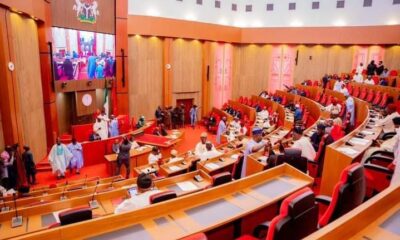Politics
Senate turns down Buhari’s request to delete section 84(12) of Electoral Act
The Senate yesterday turned down President Muhammadu Buhari’s request to amend the Electoral Act, 2022 that specifically requested for the Senate to outrightly delete section 84(12)
This followed the woeful failure of the Electoral Act Amendment Bill to scale through second reading on the floor during plenary.
The proposed law, “A bill for an Act to Amend the Electoral Act 2022” was overwhelmingly rejected during its second reading
Before a voice vote on the bill, for which the nays had it, several lawmakers spoke against going ahead to amend the Act and urged that the Senate abide by a court ruling, which stopped the National Assembly from tampering with the electoral law.
President Buhari had, in a letter to the National Assembly last week, asked the federal lawmakers to amend the Act, by deleting Section 84 (12), which, according to him, constitutes a “defect” that is in conflict with extant Constitutional provisions.
The section required political appointees to resign their appointment before participating in primary elections.
A Federal High Court in Abuja on Monday barred President Buhari, the Attorney-General of the Federation (AGF) and the Senate President from tampering with the Act.
The judge, Inyang Ekwo, in a ruling on an ex-parte application by the Peoples Democratic Party (PDP), said the Electoral Act had become a valid law and could not be amended without following the due process of law.
The Court maintained that the Electoral Act, has become a valid law could not be altered without following the due process of law.
But the Senate President, Ahmad Lawan, on Tuesday, said the court ruling would not stop the National Assembly from amending the Electoral Act 2022.
He said the court ruling violated the provisions of the 1999 Constitution (as amended) on Separation of Powers
In the move to reject the bill, Senator Adamu Aliero fired the first salvo for the bill to be stepped down after the Senate Leader, Yahaya Abdullahi, moved a motion for the bill to be read a second time.
Aliero, who came under a point of order, drew the attention of his colleagues to the provision of Rule 52(5) of the Senate Standing Order.
Read Also >> MARITIME SAFETY: NIMASA, NiMet Sign MoU
Order 52(5) provides that, “Reference shall not be made to any matter on which a judicial decision is pending, in such a way as might in the opinion of the President of the Senate prejudice the interest of parties thereto.”
He, therefore, advised the upper chamber to step down consideration of the bill pending the vacation of a court order delivered by the Federal High Court, Abuja, on Monday.
According to the Lawmaker, going ahead with the amendment of the Act was in clear conflict with the sub judice rule in law which prevents the legislature from deliberating or considering any matter already before a court of competent jurisdiction.
“Going ahead to consider the bill obviously will mean that we are disrespecting that order, and this is an institution of the Senate – the symbol of Nigeria’s Lawmaking body.
“We should not be seen to be disobeying the court order. No matter how bad that court order is, we should respect it.
“So, I’m of the opinion that we should stop considering this bill pending the time the court set aside that order, and I think I’m speaking the opinion of my colleagues here”, Aliero said.
The Senate President, while ruling on Aliero’s point of Order, insisted that the move by the upper chamber to amend the Electoral Act was in line with exercising its Constitutional duties amid following due process.
“To be specific to this particular request, for us in the Senate, it is to look at the request and follow our due process.
“Looking at the request does not mean granting the request. Members of the National Assembly are at liberty to review the request to see if the arguments by the Executive arm of government are convincing enough.
“If the arguments are not convincing enough, the National Assembly can deny the request, and that is how it is. We have no incumbrance from that order.
“So, it is for Senators here to decide to vote for this amendment or vote against it.
“I think we are not breaching any law, in fact, we are trying to promote democracy because to do otherwise may mean that one day someone will go to court and say that the Senate of the National Assembly should not sit.
“I want to appeal to all of us, that we are on the right course and my ruling remains that we are going ahead to consider the proposal which the Leader of the Senate is leading the debate.
“At the end of the debate, we are going to vote, and the vote will decide the fate of the bill.
“I’m sure all of us know that whatever we do here is to protect democracy and the sanctity of the upper chamber”, the Senate President said.
The Senate Leader was then given the floor to lead the debate on the Electoral Act Amendment bill.
Contributing to the debate, Senator Enyinnaya Abaribe (Abia South), kicked against the deletion of Section 84(12) of the Electoral Act Amendment Bill as requested by President Buhari.
He said, “There are certain things that we see which we think we don’t even have to come here to debate.
“One of those things is the fact that in every democracy, all over the world, there are certain rules which we don’t need to be told about.
“One of those rules is the fact that you cannot be a referee and a player on the same field. It is either you’re a referee or a player.
“So, every other place in the world where democracy is practised including Nigeria, we don’t need to be told that if we want to run for office, we have to resign. That is a sine qua non that we don’t even need to debate.
“Yet here we are today in Nigeria, and people think they can sit in an office and contest an election and become candidates and continue to sit in that office until the date of the election.
“So, how would we continue to debase democracy in this way?
“Mr President, I think, a cursory look at this paper shows that this paper is dead on arrival. And I urge you, my colleagues, to help us to continue to deepen democracy by insisting that this bill not be read a second time in any manner whatsoever.”
Smart Adeyemi (Kogi West), who was also opposed to the consideration of the bill said, “one of the hallmarks of democracy is Justice, Fairness and Equity.
“Indeed, Mr President, it is a settled matter in law that you cannot be a judge over you own case.
“In any election, where people have the added advantage of holding executive power, either by proxy or directly or by appointment, for such people to have access and compete with others who came from the street, I think is an unjust society.
“Therefore, Mr President, I disagree with all the arguments on the need to consider a decision that has already been settled.”
A move by the Deputy Senate President, Ovie Omo-Agege, to sway his colleagues were unsuccessful.
The bill, when eventually put to a voice vote for a second reading by the Senate President after its consideration, received a resounding ‘nay’ from Senators in the majority across party lines
During the voice votes, a drama had ensued as Lawan after calling out for votes was shocked that the Ayes was a lonely voice for which he decided to repeat the call asking his colleagues whether they did not hear him.
After the repeated call for votes, the Nays still had it overwhelmingly
The Senate leader Yahaya Abdullahi while leading the debate said, “Permit to lead the debate on this very important bill seeking to amend section 84(12). The bill was read the first time on Tuesday
“You may recall that the bill was passed into law and assented to by the President and commander in chief on the 25th February 2022, however, the president expressed reservation on section 84(12) which states as follows, No political appointee at any level shall be a voting delegate or be voted for at the Convention or Congress of any political party for the purpose of the nomination of candidates for any election in cases where it holds earlier than 30 days earlier to the national election.
“This provision has been interpreted by as being interpreted by the executive arm government as introducing qualification and disqualification criteria that are ultra vires to the Constitution by way of disqualification of serving political officeholders.
“It is my humble opinion that this proposed amendment be looked into by this distinguished senate which can come out with an objective position that will strengthen our electoral processes as well as our democratic disposition.
Politics
State Of Emergency In Rivers Necessary – NNPP

The New Nigeria Peoples Party (NNPP) has thrown its weight behind President Bola Tinubu’s declaration of a state of emergency in Rivers State, arguing that decisive action was necessary to prevent further deterioration of the crisis.
Speaking in an interview with the News Agency of Nigeria (NAN) on Saturday in Lagos, NNPP National Chairman, Dr. Agbo Major, stressed that no responsible government would sit back and allow instability to escalate unchecked.
“President Tinubu is the Chief Security Officer of Nigeria. The information available to him as president from intelligence sources may not be in public purview,” Major said.
READ MORE: NNPP Has Failed Kano, APC Will Reclaim Power Ganduje
He added that the decision to suspend the state government was based on the severity of the crisis, which could have worsened without swift intervention.
“The government in Rivers was suspended, and no one can actually say what would have happened by now, judging from the deepening crisis.
“The crisis was further compounded by some leaders who, instead of offering advice or promoting peace during the turmoil, allowed it to escalate before later stepping in to criticize,” he stated.
Major described the security situation in Rivers State as unacceptable, warning that it posed a threat to lives and property.
He defended President Tinubu’s leadership style, noting that making tough decisions, even when unpopular, was a mark of true governance.
“It was a difficult decision to remove the oil subsidy; one that no previous administration was willing to make, whether right or wrong. Tinubu took that step, and we are gradually emerging from the crisis, moving forward for the better,” he explained.
According to him, the government must have had access to intelligence beyond what was available in the public domain before making its decision.
“Six months or less of the emergency rule is in the interest of Rivers residents, democracy, and Nigeria. It is our hope that indigenes of the state shall be streetwise and disregard those with personal interests, who are crying foul,” Major added.
The NNPP chairman urged Nigerian leaders to be mindful of their statements, warning that inflammatory remarks could worsen tensions in Rivers State and affect national stability.
“The Renewed Hope Agenda for a greater Nigeria should be our focus. It is centered on hard work, trust, science and technology, agriculture, education, the rule of law, and more. Focus should be on constructive criticism that will make for greater performance,” he advised.
Addressing concerns about Federal Capital Territory (FCT) Minister Nyesom Wike’s involvement in Rivers politics, Major argued that Wike, as a former governor and indigene, naturally has interests in the state.
“Wike as a minister is neither the Inspector General of Police, Chairman of EFCC, Attorney General of the Federation, Chief Judge of the Federation, nor President of Nigeria. If our institutions are not compliant with their statutory functions, why can’t we leave Wike alone to live his life?”
He also emphasized that while opposition to government is vital for democracy, it must be constructive and aimed at fostering good governance.
“Opposition to the government at the center is the lifeblood of democracy and a catalyst for good governance when it is constructive and aimed at enhancing productivity.
“However, if opposition simply means dismissing everything the government does as wrong, then something is definitely amiss,” Major concluded.
Politics
Okpebholo Stands With Tinubu On Rivers State

Edo State Governor, Senator Monday Okpebholo has expressed solidarity with President Bola Ahmed Tinubu over the state of emergency declared in Rivers State.
The Chief Press Secretary to the Edo State Governor, Fred Itua, vented this in a statement in Benin City on Thursday night, asserting that his principal was not consulted by his colleagues in the South-South Governors’ Forum before going public with their view.
ALSO READ: Global Money Week: NGX, CBN, MinieMoney Preach Financial Literacy To Students
Itua wrote, “The position by the Governors of the South-South, opposing the declaration of a State of Emergency in Rivers State by President Bola Ahmed Tinubu, did not get the nod of Governor Okpebholo. Governor Okpebholo was neither consulted nor informed.
“While Governor Monday Okpebholo acknowledges the right of other Governors in the South-South geopolitical zone to take a position, he, however dissociates himself from any statement that opposes the declaration of a State of Emergency in Rivers State by President Bola Ahmed Tinubu.
“Bola Ahmed Tinubu, President of the Federal Republic of Nigeria and the Commander-In-Chief of the Armed Forces, understands the issues at stake.
“Governor Okpebholo supports actions so far taken by President Bola Ahmed Tinubu that will bring lasting solutions and peace to Rivers State and the South-South geopolitical zone.”
Politics
2027: Okpebholo Assures Tinubu With Snatch Of 17 LG Chiefs From PDP

In what political watchers note as a clear demonstration of bowing to political maneuvering and arm-twisting, 17 Local Government Chairmen, elected under the Peoples Democratic Party (PDP) in Edo State have decamped to the ruling All Progressives Congress (APC).
This, according a statement in Benin City from the Chief Press Secretary to the Edo State Governor, Fred Itua, has bolstered the confidence that President Bola Ahmed Tinubu would sweep the votes come 2027.
He cited his boss, Edo State Governor, Senator Monday Okpebholo as having predicted that President Tinubu will win the 2027 presidential election with a landslide.
ALSO READ: PHRC Fully Operational, Producing Refined Products – NNPC Ltd
According to Itua, the Governor disclosed this at the New Festival Hall of Government House, Benin City, while addressing chairmen of the 17 local government councils who dumped the Peoples Democratic Party (PDP) for the All Progressives Congress (APC).
Governor Okpebholo who praised the leadership style of President Tinubu said steps that previous administration were afraid to take that would have put the nation on sound footing for development and growth is what he took by removing the contentious fuel subsidy.
He said his administration is in to develop the State and make the lives of the people better.
The Governor said his administration is ready to work to change the lives of the people for the better, adding that in just four months in office, he and his team have changed the narrative of Edo State.
He said: “I welcome you all our Chairmen who have come to join us, and I praise you for the courage and bravery to leave your party to join the APC. It takes a grounded politician to take this step you have taken today.
“Let me draw your minds back to where we are coming from as an administration. We practically met that Edo was not working when we came into office. What we met in Edo were insecurity, killings, looting Edo treasury using consultants to deceive Edo people and other backward policies implemented by the Obaseki led administration, but we came and changed the narrative.”
The Governor used the occasion to thank a former governor of Edo State and Senator representing Edo North Senatorial District, Comrade Adams Oshiomhole; the State chairman of APC, Jarret Tenebe and all members of the APC for their continued support and sacrifices.
He also thanked the councillors who spoke for their various communities through the impeachment exercises in the councils and subsequent election of these new chairmen across the 17 local government areas of Edo State.
“2027 is a reality in Edo State as President Bola Amed Tinubu will continue in office. I charge the 17 of you today that the campaign for the election of President Bola Tinubu has started here today. Go back to your various local governments and erect his bill boards to draw home the message of re-electing President Tinubu.
“There is no vacancy in 2027 in Abuja. Those forming a political party now can’t rule us. They ruled their States and the people suffered from kidnapping, but since they left offices, their States are now free. Such people can’t rule Nigeria,” he declared.
Governor Okpebholo assured the President that Edo is right behind him, predicting a landslide victory in the election as the APC will continue to lead the country.
He said he and his deputy, Rt. Hon. Dennis Idahosa are both committed to the development of Edo State, and his administration has come to rescue the State.
The Governor expressed optimism that leaders of the opposition parties in the State will join the APC fold following his infrastructural development strides in the State.
The party secretary who received the decampees on behalf of the APC, Lawrence Okah thanked the new members, urging them to unite with other members of the party as the administration of Governor Okpebholo has come to rescue the State from retrogression.
“The desire of the governor is to unite the State and ensure the people enjoy the dividends of democracy through his developmental strides,” he said.
Responding on behalf of the Chairmen, the ALGON chairman and chairman of Esan Central Local Government Area of Edo State, Hon. Kelvin Iyere thanked the Governor and all APC party faithfuls for accepting them into the fold of the APC.
He noted that they decided to decamp from PDP because of the crisis in their party and their love for the development that Governor Okpebholo has brought to Edo State.
Dignitaries at the event included the Deputy Governor, Hon. Dennis Idahosa, Chief of Staff to the Governor, Gani Adams, Secretary to the State Government, Musa Ikhilor, Members of the Edo State House of Assembly (EDHA), serving commissioners, other top government officials and APC party faithful among others.
















